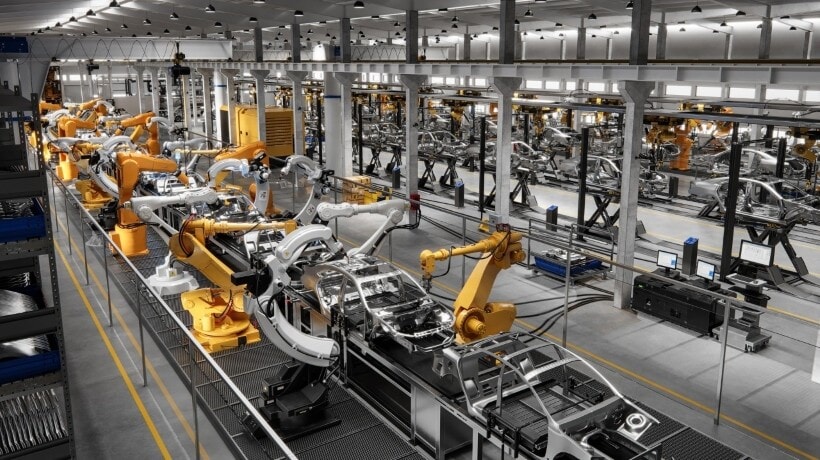Industry 4.0 Changes The Manufacturing Industry
Automation, IoT, machine learning, advanced analytics, cognitive technologies, and others are geared to create an enterprise that is more interconnected and data-driven. The end objective is to enable better decision making and improve business outcomes. The impact of these technologies is felt in all industries, and manufacturing is no different. The rapid adoption of technology has paved the way for disruptive development in this sector and has brought to us the Fourth Industrial Revolution, commonly known as Industry 4.0, that brings with it the promise of changing the manufacturing industry as we know it.
Industry 4.0 – A Primer
Industry 4.0 employs the use of technologies such as Big Data, Industrial Internet of Things, Artificial Intelligence, and others to find solutions to complex problems and make the assembly line more efficient. According to a PWC report called ‘Industry 4.0: Building the Digital Enterprise’, we are already in the front and center of this revolution with over 72% of manufacturing companies using data analytics to improve customer intelligence and customer service. 35% of companies adopting Industry 4.0 expect 20% higher returns over the next 5 years, and 86% of manufacturers expect lower costs and higher revenues.
Countries, such as Germany and Japan, have been the pioneers of Industry 4.0 and have shown that its adoption has improved their business outcomes. It won’t be an exaggeration to say that Industry 4.0 has brought about a paradigm shift in manufacturing by replacing rigid value chains and transforming them into highly flexible networks.
Why Is Manufacturing Moving Towards Industry 4.0?
Since Industry 4.0 is built on the concept of end-to-end visibility, efficiency, and agility across every touch point in the value chain, it gives manufacturers the capability to assess how they can reduce overhead costs while remaining flexible to respond to unforeseen changes in production programs.
Industry 4.0 is more than just production. It is all about how smart and connected technologies can change the way products are designed, built, used and maintained. Apart from transforming the production cycle, Industry 4.0 also transforms the organization itself by presenting new ways to consume and interpret information, and achieve operational excellence by improving decision making. Deutsche Bank Research, in their report the ‘New Industrial Revolution’ states that the smart manufacturing initiatives show a productivity jump of almost 30%.
Clearly, Industry 4.0 is not just about the shop floor but also about the entire organization and how technology can be used to harness growth. We are seeing increased use of sensors and wearables, machine learning, advanced computer numerical control, and robotics to enable product improvements, and rapid prototyping to consequently enable innovation in new offerings. The impact of Industry 4.0 can be felt by how the organization operates and also how its ecosystem of customers, regulatory compliance, third-party experts, suppliers, etc. function and interact. It focuses on improvements that lead to enhancements to productivity, better risk reduction, incremental revenue growth, and generating new revenue sources.
Industry 4.0 Also Signals A Shift In Workforce Dynamics And Training Needs
At the same time, Industry 4.0 means a significant shift in the manner in which employees in manufacturing work today, and how they are expected to do so. The rise of automation and connected systems also signals workforce transformation. And this is where the manufacturers’ dilemma begins. Manufacturers not only have to lure tech-savvy talent but also have to reskill or upskill existing resources to harness the power of the new disruptive manufacturing technologies. A highly technologically advanced environment means more employee contributions revolving around technology, digital, and intelligence roles. The isolated, optimized units need to work together as completely integrated automated units with optimized production flows. These developments change the traditional production relationships.
Given the complete change in the manufacturing ecosystem, it becomes imperative to prepare the workforce and conduct strategic workforce planning.
- For this, manufacturing companies have to look at hiring skilled resources for new job roles, adapting existing roles to the new methodologies, and upgrading IT skill of all resources.
- Industry 4.0 also means a greater focus on compliance, regulatory, and security aspects, and demands all investments to be thoroughly updated on all new developments in these areas.
- Since Industry 4.0 is a paradigm shift in itself, manufacturers have to ensure that all resources are suitably skilled to handle their new roles and responsibilities, and are capable of managing the change in work patterns and in processes.
Training and development, thus, becomes a key area to concentrate on to enable this workforce evolution.
In the age of Industry 4.0, manufacturers need to prepare their entire workforce to harness the power of technology. This means frequent training and updated Learning and Development initiatives that address the pain points and learning gaps of the existing workforce. It also means accelerated onboarding and skill upgrades for the new hires to make them multi-skilled as with Industry 4.0.
The Way Ahead
In order to be prepared for this revolution, manufacturers have to ensure that all their resources are up to step to face the new order. Learning and Development initiatives have to be more inclusive and take into consideration the varying needs of the resources. To achieve great training outcomes and to ensure that training costs are controlled, manufacturing companies need a new age training program…one that is complementary to the new age manufacturing unit.
Given the large resource pool that needs training, the diverse training needs of the workers—a large and often distributed workforce—manufacturing industries need a new training model that can proactively improve resource knowledge base. Training programs have to be more scalable, personalized, and flexible to adjust to the dynamic needs of Industry 4.0.
With the blended learning approach, all awareness and knowledge sessions can be conducted leveraging eLearning, while classroom training can be used for skill and expertise development.
Blended learning takes the pain out of existing Learning and Development initiatives and gives manufacturing companies access to a huge knowledge repository, a talented resource pool of industry experts who can aid training, the flexibility to scale training programs in short time frame, and the ability to disseminate content in easily retainable bite-sized chunks in a device agnostic manner.
It is now clear that Industry 4.0 is going to be the silver bullet that helps manufacturers stay ahead of the curve in an increasingly competitive and complex market. However, in order to deliver on its promise, manufacturers have to make sure that they arm their workforce with the right tools to do their jobs better. And in this case, there is no tool that is greater than knowledge.









